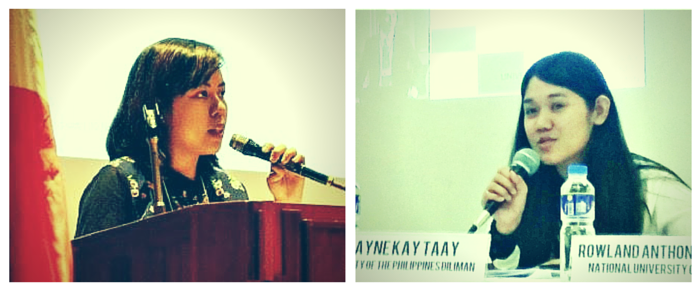 Two Korea Studies graduate students of the UP Asian Center presented their papers at the 4th Philippine-Korean Studies Symposium held from 10 to 11 November 2015 at the National Institute of Science and Mathematics Education Development (NISMED), University of the Philippines Diliman.
Two Korea Studies graduate students of the UP Asian Center presented their papers at the 4th Philippine-Korean Studies Symposium held from 10 to 11 November 2015 at the National Institute of Science and Mathematics Education Development (NISMED), University of the Philippines Diliman.
Kyla Seachon presented “Korean Overseas Volunteers (KOVs) in the Philippines: Challenges and Potentials” as part of the panel “Policy/International Relations.” Below is the abstract of her paper:
“Foreign Volunteers have contributed greatly to Philippine development. Specifically, the International Volunteer Service (IVS) promotes the provision of technical assistance to priority areas. Among the first deployed in the country are the Korean Overseas Volunteers (KOVs). Efforts put into the programs and projects by the KOVs have solidified their existence in the country. This is seen through the continued clamor for assistance of KOVs in various sectors. Primarily, KOVs are in the Education, Health, and Agriculture technology sectors, which are in line with South Korea’s comparative advantages as well. As KOVs in the Philippines grow in number and in scope, it would be helpful for Korean studies enthusiasts and academics to learn more about the challenges faced by KOVs in the country, outcomes achieved by KOVs and potentials for further impact. Specifically, what have they already accomplished in the country, and what are the areas of improvement? Interviews with key informants and some KOVs will be utilized in the study.”
Meanwhile, Shayne Kay Taay presented “Deconstructing Drama Misaeng: A Contemporary Look at the Changing Role of Hierarchy in Korean Workplace” as part of the panel “Korean Culture and Language.” Below is the abstract of her paper:
“Korea is transforming, so is their conformity to their traditional values, and one of these is their strict adherence to office hierarchy. This paper presents a changing facet of hierarchy in contemporary Korean workplace and its role in attaining harmonious relationship between superior and inferior office workers. This is observed in the award-winning Korean office drama “Misaeng” which is hailed by viewers as the “salaryman’s bible” (Ahn, 2014). My conceptual framework involves a significant deconstruction of “Misaeng” and an analysis. To do so, I selected scenes and dialogues depicting the changing facet of hierarchy with a high regard to the characteristics of each office workers portrayed. Then, I compared and analyzed these materials to the Korean norm of reverence to hierarchy emphasizing on the differences represented in the drama. I found out that hierarchy is playing less important role especially in attaining the uri (we) among hierarchically-divided office workers and that they are still conforming to the traditional Korean values like kibun (feeling) and chemyon (face). However, as they start to boost their human value, individual skills over educational background, and morality, traditional reverence to hierarchy is challenged. This entails a fundamental paradigm shift on how corporate world sees the negatives of Korean workers’ attitude that is despite being hard workers, are passive and incompetent when facing their superiors. Moreover, it is an indication of how Koreans are transforming their norms to attend the demands of globalization.”
UP Asian Center Professorial Lecturer and former dean Dr. Eduardo Gonzalez was also part of the symposium. He presented “Korean Studies in the Philippines: Opportunities and Challenges” as part of the roundtable “Progress and Prospects: Korean Studies Research and Program Development in Philippine Universities”. He also delivered the message of the UP President as Director Designate of the Korea Research Center, University of the Philippines.
Themed “Philippines-Korea in the Changing Asia: Drawing Connections”, the 4th Philippine-Korean Studies Symposium showcased panels on Korea in the arena of international relations, progress and prospects of Korean Studies in Philippine Universities, migration and history, language and culture, as well as perceptions on Filipinos and Koreans, among others.
The symposium was organized by the UP Department of Linguistics in partnership with the Korea Foundation and the Embassy of the Republic of Korea, among others. Photo: Kyla Seachon (L) and Shayne Taay (R). Taken by the organizing committee of the 4th 4th Philippine-Korean Studies Symposium.
The Asian Center offers M.A. degrees in Asian Studies with four fields of specialization: Northeast Asia, Southeast Asia, South Asia, and West Asia. The Center also has an M.A. program in Philippine Studies that allows students to major in Philippine society and culture, Philippine foreign relations, or Philippine development studies. The Center offers a Ph.D. program in Philippine Studies in conjunction with the College of Arts and Letters and the College of Social Sciences and Philosophy. For an overview of these graduate programs, click here. The Asian Center also publishes Asian Studies: Journal of Critical Perspectives on Asia, the latest issue of which can be downloaded at the journal's website. View recent and upcoming Lectures & Conferences and read other News & Announcements. Join our mailing list to receive invitations to lectures, conferences, etc.

